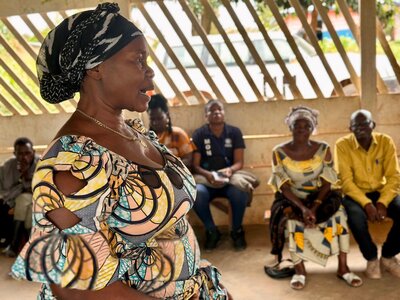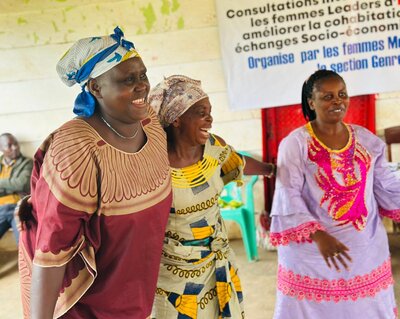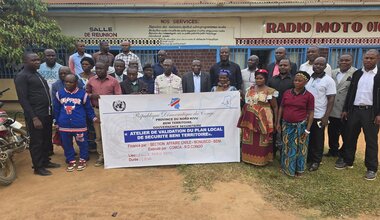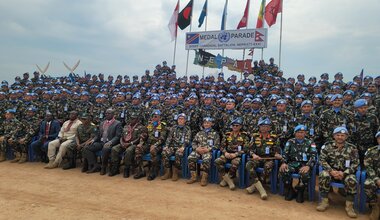Ituri: In Djugu, Women Revive Peace Dialogue Between Mandro and Ezekere
Five years had passed before notables from the Ezekere community finally set foot in Mandro again. It was a historic day, marked by emotion, sincerity, and hope, as Lendu and Hema sat face to face, spoke to each other, and dared to cross the barrier of fear.
This meeting was made possible thanks to the initiative of women mediators in Ituri, trained by MONUSCO’s Gender Section, who organized a local mediation session on 3 June. The activity brought together mainly women leaders from both communities, along with representatives of civil society, youth groups, and community chiefs, with one shared goal: to improve peaceful coexistence and restore socio-economic exchanges between Mandro and Ezekere.

Mandro, located 12 km northeast of Bunia, is a rural locality in Djugu territory, Bahema Banywagi chiefdom, Tambaki grouping. It is mostly inhabited by Hema communities who live from cattle herding and subsistence farming. Ezekere, located 10 km from the city, belongs to the Bedu Ezekere grouping in the Walendu Tatsi sector. Its population is predominantly Lendu. The community practices agriculture and artisanal work, notably the well-known production of handmade knives.
These two localities have long been affected by intercommunal violence. Although separated only by a small river, the accumulated traumas have turned it into an internal border, impossible to cross.
Words, smiles, embraces, and hopeful glances
This Tuesday in Mandro, smiles reappeared. Embraces among women, handshakes between community chiefs, shared laughter and improvised songs — simple yet powerful gestures that demonstrated a genuine desire to break down the barriers between communities. Thirty-six community leaders (twenty women and sixteen men) and five local authorities, all men, took turns to speak, sharing their fears, confronting their prejudices, and discussing the social and security realities that fuel tensions.
The mediators led practical exercises inspired by mediation techniques, helping to bring out deep-seated fears and encouraging participants to work together on solutions.
Marguerite, secretary of the Ezekere women leaders, came to Mandro for the first time. Calm and determined, she said:
"When I told my family I was going to Mandro, they were afraid. But I was confident. It's not normal to be afraid of visiting your neighbors. Today, I spoke with the women of Mandro — we shared our pain and our dreams. I will return, even just to go to the market."
Micheline, a teacher originally from Mandro who works at a school in the Lendu grouping, embodies the possibility of a fragile but real coexistence:
"I live this coexistence every day. There are tensions, but also life — children playing together. Seeing our two community chiefs sitting side by side and shaking hands today moved me. These are simple acts, but they carry deep meaning."

MONUSCO in support, women in action
This activity is part of a series of initiatives led by MONUSCO to strengthen community dialogue in Ituri. Just like in Djugu, where the reopening of several markets has recreated shared spaces for interaction, the Mission actively supports grassroots mediations.
Love Kitambo, a mediator recently trained in Entebbe in Third-Party Neutral (TPN) mediation techniques with the support of MONUSCO's DDR-S Section, was part of the facilitation team. She recalled:
"We conducted pre-mediations, identified fears and roadblocks. Today, everyone was able to express their feelings. We saw tears but also smiles. One woman told me she struggles to cook because good knives, which are only sold in Ezekere, are no longer accessible. Small details, but they show how the connection has been broken. We want to rebuild it."
Alain Rubenga, Gender Officer at MONUSCO, emphasized the essential role of women in these processes:
"Women are not the ones who start conflicts, but they suffer the heaviest consequences. Today, they want to become agents of peace. That is why we support them in leading these dialogues in the heart of the villages — where peace is born."
Toward lasting peace
At the end of the dialogue session, participants called on the government to accelerate the P-DDRCS process and integrate peace education into schools. They also recommended that MONUSCO continue supporting community mediation and trauma healing activities, especially for women and girls.
Through this initiative, MONUSCO reaffirms its role as a catalyst for dialogue and peace efforts in Ituri. By supporting women mediators and reconnecting communities, it helps rebuild bridges of trust. Because behind every extended hand, every exchanged glance, lies one more step toward peace.
On June 3 in Mandro, despite the scars, the communities showed that they could still believe in a common future.

 UN
UN United Nations Peacekeeping
United Nations Peacekeeping






